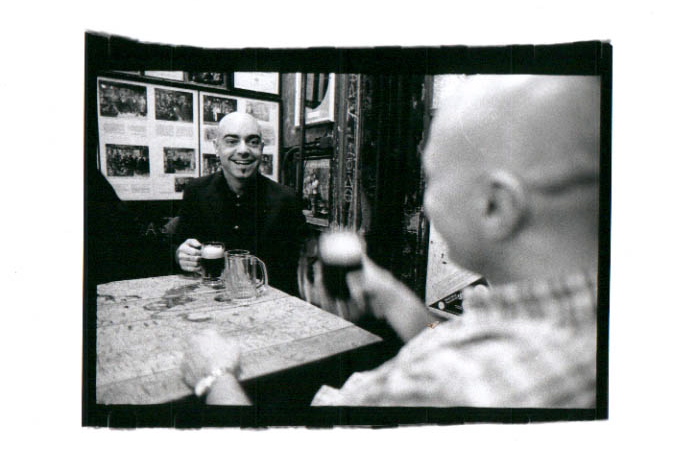This article was originally published as the cover story for RUDE International in November 2001.
Flogging Molly members (and respective hometowns):
Dave King (vocals, acoustic guitar) – Dublin, Ireland
Bridget Regan (violin, tin whistle) – Detroit, Michigan
Matt Hensley (accordian, pro skateboarder in his spare time) – San Diego, CA
George Schwindt (drums) – Columbus, OH
Dennis Casey (electric guitar) – Rochester, NY
Nathen Maxwell (bass) – Los Angeles, CA
Bob Schmidt (mandolin, banjo) – Los Angeles, CA.
I first stumbled upon the glory of Flogging Molly a few years ago in the East Village, NYC. I had been out with a group of friends the previous night, cavorting drunkenly at our usual haunts. The main topic of conversation was a general moan of dissatisfaction with how staid the music scene had gotten. There hadn’t been many good shows lately, especially since a lot of the mid-sized clubs in New York had been shut down and left to tauntingly rot as empty eye sores. Most of us felt that to add insult to injury, there wasn’t much solace in the record stores either. Nothing that’d come out of late had any energy or newness or truth in it. It was looking to be a cold year.
That next morning, hungover, wandering St. Marks place with a friend and turning this problem over in my mind, we walked past the dark gaping maw of The Continental club. Pausing underneath the black awning to check the band list scrawled on the chalkboard out front, one name caught my eye – Flogging Molly. I remembered hearing about this band, a septet from California… they were Irish influenced or something, some kind of punk pub rock thing. A couple people from the West Coast had intermittently raved about them to me over the past few years, but that was all I knew.
The show was free and the beer was cheap, so that night I came back with a posse. My friends and I weren’t some tiny dissatisfied caste of gripers. Feelings of boredom and disgust had pervaded the entire Village ever since all the yuppie scum had descended with their Starbucks and Gap and the sky high rent increases like a crop of locusts, sucking the neighborhood of its juices. I hadn’t seen that many punks or skins around at shows and I was starting to have strong suspicions that they turned coat and fled to New Jersey or Brooklyn or the suburbs rather than stick it out. But that night, in the dark length of the bar, they reappeared with a zeal and energy I hadn’t seen since long before Coney Island High shut its doors. Flogging Molly, a band from California, had rousted the NYC spirits from hibernation. There they all were, pouring stout down their throats and dancing up a frenzy. My friends and I looked at each other, amazed and invigorated, shut our gaping mouths, and joined right on in.
I’ve seen Flogging Molly many times since then — several times during their house-band stint where they played twice a week in New York, Boston, Philly, DC, and other East Coast locales. They hit the Warped Tour in summer 2001, trading off between the side and main stages, and then slid right into a solid support slot for those Mighty Mighty Bosstones. I watched as they opened for the BTones in front of a sold-out crowd of thousands at New York’s Roseland Ballroom, and to my delighted surprise, most of the crowd knew all the words.
A few months later, when Flogging Molly played Conan O’Brien, they played their song “Salty Dog” so fast it was like a tiny gem – furious and joyous all at once. The next day they packed the Knitting Factory in NYC, and after joking about their speed-charged debut on national television, Dave suggested they see if they could play it even faster. They ripped into an exhilarating version — the crowd doing their best to dance in time, laughing with the energy of it all.
It is truly amazing the sound that these six men and one fiddle wielding sorceress can produce. Dave is obviously the leader but it seems like he’s more of a ringleader of a band of musical hoodlums than in a kind of power position. He’s a solid anchor for the storm of their music, sometimes leading, sometimes being propelled by the energy from the rest of the group.
Flogging Molly’s music is a heady mix of tightly orchestrated traditional Irish narrative-style ballads, fused seamlessly with a volatile and aggressive punk drunk and anarchy-fueled drive. They play the sentimental tunes with heart and laugh and growl along with the more frenzied ones. It’s a passionate sound, reigned in by the arrangement, tight and broad and always with the same manic intensity. Watching them sometimes I feel like it’s a reprise of Fantasia, where the instruments have magically taken over themselves and are playing their sweating polished wooden hearts out – whisking these magician apprentices along for the ride.
Interview with Dave King and Bridget Regan conducted over many pints of Guinness at McSorley’s Old Ale House, East Village, NYC. All photos by Annick Sjobakken
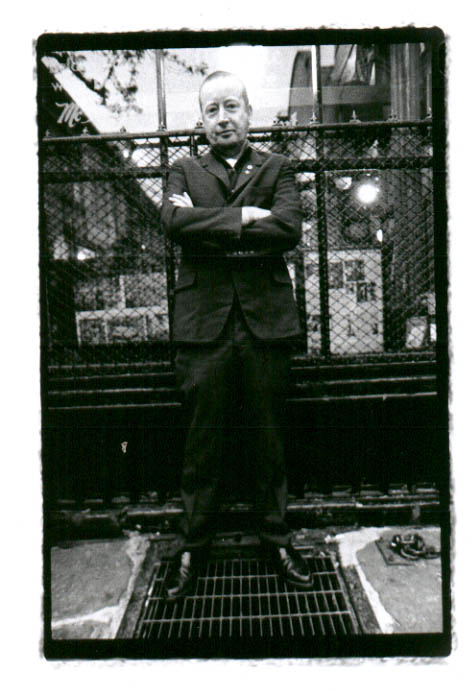
Dave King by Annick Sjobakken
How long have you been together?
Dave: A little over three years. My first gig was St. Patrick’s day three years ago at Molly Malone’s (a bar in LA). Its been a lot of different incarnations of the band, but this is Flogging Molly.
When did you originally come over to the States?
Dave: I come over ten years ago, I was brought over by a record company. They were a real fucking pain in the ass and I couldn’t handle it so I decided to quit. Before that, I played in a band called Fastway with Eddie Clarke from Motorhead. It wasn’t pure heavy metal, it was a blues, hard rock derivative type of thing. It was okay for awhile, I was a kid, I was eighteen. It was fun and we did very well, but then it went sour. Everybody tried to put in their two sense and it just lost its whole momentum, it lost direction. So I left that and then I come over here and it was really hard.
You came over to the States then?
Dave: Yeah, Geffen Records invited me over to put a band together. That worked for about two years. The band was called Katmandu. Then I went solo and put out a record with Epic Records. I was starting to get fiddles and mandolins involved.
Did you always eventually want to make that kind of music?
Dave: Yeah, I think I was getting to the stage where — it was such a big part of my childhood growing up — and I never really had the chance to express myself in any band I was in. Back then it was always me singing and being under the banner of the band, not really what I feel. When I started getting into all this instrumentation stuff, the record company just lost interest. They were getting me all these weird producers that did Aerosmith and people like that. They said, if this is really what you want to do, let’s not make an album, let’s just drop you because it’s just not going to happen. I went solo. I just picked up my acoustic guitar and started writing for myself.
Did you play acoustic guitar before that?
Dave: Yeah, somewhat. I used to write songs, but really very badly. Then I started writing songs for myself, trying to express myself, and that’s how Flogging Molly started.
The first time you picked up the guitar, was it was this type of music you intended on teaching yourself or learning to play?
Dave: Yeah, when I was in Fastway I had written a couple songs musically as well. But they were really basic things. When I started to get Flogging Molly together and write for myself, I started to learn how to play the guitar as well. At the same time I was learning how to write songs vocally and lyrically. It was a combination of all that.
Why did you pick acoustic instead of electric, did you like the sound better or feel you could express yourself better?
Dave: For me, it was very earthy. I didn’t have an amp, I didn’t have cables, I could sit down with an acoustic guitar anywhere and play and sing. That’s what I wanted to do. I had a little bit of a “Dave King” thing going. Bridget saw us play and she said to me — you know I play fiddle. I was like, fuck yeah. Then George said to me — if you ever need a drummer… and he got involved.
So basically everybody came to see you and said, “do you need my instrument”?
Dave: Yeah, Bob was like, if you need a fill-in mandolin player, I’ll fill in. He’s been here ever since. Everybody’s been like that.
Bridget: But you asked me, if you remember.
Ha-ha. The truth comes out.
Dave: Yeah… it pretty much created itself.
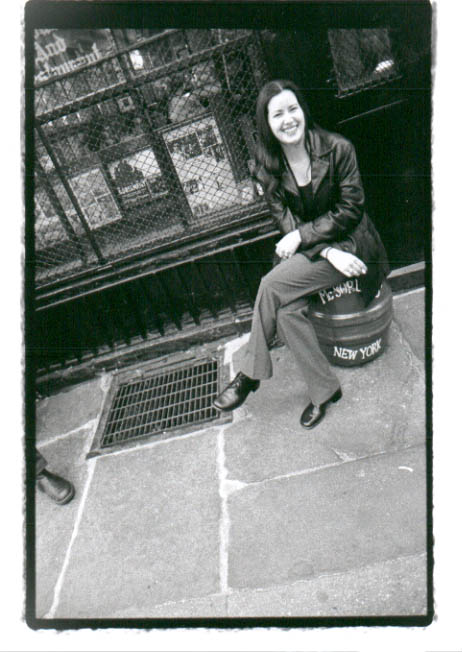
Bridget Regan by Annick Sjobakken
When you say this was music you grew up listening to, who were some of the artists? Did you hear them around or through your parents?
Dave: I was first introduced to a band called The Dubliners. My father bought me an album when I was a kid, and I’ll always remember that day. The Dubliners to me were the first real punk folk singers, they would sing about things that were very dicey, very dodgy to be singing about but they fucking did it anyway. I always admired that.
As I got older I started to get into a band called Horslips. They were like the first — I’m talking like in the late 70s. They were the first type of band I’d seen that were mixing traditional Irish instruments with the rock of the times. They had the guitars, the drums and the bass, but then they had the fucking fiddles and tin whistles. I used to go and see these guys. I tell ya, I used to love the subtleties of it, and then the absolute chaos of it. And that’s what I try to do with this band. Bands like that I always loved. Lyrically, I like something that has a bit of a hard edge to it. You could be singing a very melodic melody but at the same time be saying something that is really deep and wrenching inside you. That’s how it all came from my childhood and what I listened to.
Were your parents big music fans?
Dave: Yes, yes they were. My mother was a great Irish dancer and my father was a great singer.
Did he ever perform?
Dave: Oh yeah, in choirs and stuff like that. Every Saturday and Sunday night at my house… We were like bitch-bollock fucking poor. I mean we had not a cent.
Where did you grow up?
Dave: I grew up in a place called Beggar’s Bush. It was the last British army barracks in Dublin. My father was the first civilian to move into it. A few years later, I was born. It was really hard and really empty and really gray. But we had a piano. A standing-against-the-wall piano. Every Saturday and Sunday night my dad’s brother would come round with the accordion, my mother’s brother would come round with the fiddle. She’d play piano. It was really great. I always used to love that sound.
You know… you never think that in years to come that something like that influenced you in any way. You don’t think about it at the time. But when I look back and when I listen to my songs now and my lyrics, it’s right back to that. It’s something I shouldn’t be afraid of, you know? I’m basically just bringing my life to life.
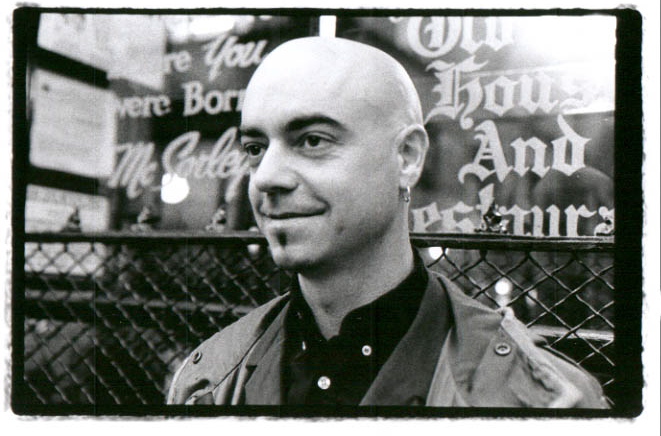
Dennis Casey by Annick Sjobakken
When you write songs, do you begin writing the lyrics with something in particular that you want to say?
Dave: I never start to write and try and say something. I usually have the guitar and I sit round at my house and I put a few chords together. Different melodies will come into my head and then I’ll get an idea for a lyric. It usually doesn’t take that long until it all comes to be. Don’t ask me to sit down and play guitar and try and write a song, I can’t do that.
I can just literally, if I feel moved or motivated in whatever way, if I think about something from my past, whether it be my father or my family years or stuff like that. Something that will inspire me to write. I always try to make not only myself think about what I’m writing, but hopefully the people who listen to the music and read the lyrics think about what they’re reading as well. I think it’s so easy to write down a couple of lines and make it rhyme. I did that for so many fucking years. It was crap and it never fulfilled me in any way whatsoever. So now when I try to write I really try to say something that I can look back at and go, that’s exactly what I felt at the time and I did it the best way I could. That’s how I approach a song. When I get the basis of a song down lyrically and musically from start to finish, I’ll go back all the time. First I’ll come out with the inspiration and I’ll blot it down on the paper, but then I like to really hone it in, to make it all work for me.
I assume that you write the solid foundation of a song and then everyone adds their own instrument into it. Do you orchestrate that? Do you have final say?
Dave: I put down what I think is a solid foundation, but then I bring it into the rest of the band and they put in what they think. It’s good to have other people who love what you’re doing. They’re not going to sit there and go, well that’s crap. They were never there for it to be crap, because everyone that’s in the band as I’ve said has been slowly brought into the band because they liked what I was doing to begin with. Their job basically is that they enhance what I do, they take what I do and turn it into Flogging Molly. Which I think is a very unique situation.
You know, a lot of my songs start with “I”, or “me”, and yet it still is a band. I influence them and they influence me and that’s the way it works for us. It’s really cool.
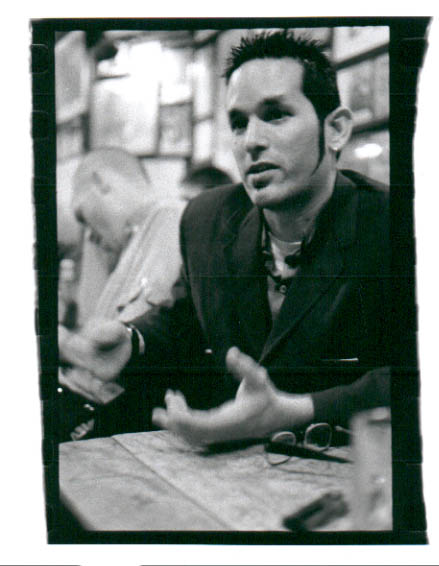
Bob Schmidt by Annick Sjobakken
Most of the stuff on the album is your own, but you do a couple covers…
Dave: We do “Delila” by Tom Jones. We’ve done “What Made Milwaukee Famous”, which is an old blues song, believe it or not. We’ve turned it into ours, and “Delila” is completely our song now too. Everything else is original.
What are the influences that stay with you, as well as the more recent musicians you enjoy?
Dave: I’m influenced by so many things, from glam rock, to punk, to classical music. I’m influenced by a lot of different bands. We’ve recently done a few shows with the Bosstones, the Gadjits, the U.S. Bombs. It’s fantastic to see this great music being played in this atmosphere of music that we have today, which is in a very sad state. But I’ve been influenced by everybody from fucking Freddie Mercury to Beethoven for chrissake, I mean, it’s all over the shop. Once I feel somebody’s soul in their music, no matter what it is, no matter what type of music it is, you can feel a certain energy in the music that somebody has put down everything for. Sometimes you get that from bands or musicians and I’m always attracted to that.
It’s a treat for me to play with bands like the Mighty Mighty Bosstones. And for them to be what you always thought they would be — not only great musicians but beautiful people. You know, that means more to me than anything else. Because there are so many bands I have played with that are such dickheads. That they were my childhood heroes and then you get to meet them and it totally fucks up the whole deal on you, it really does. From the Sex Pistols to Stiff Little Fingers, it’s like fuck.
It just makes it that much better when you meet people who are fantastic musically and they’re such good people too.
Dave: You know I feel like… I’ve come from nothing in my life, and I’ve still got nothing, monetarily, in my life, but I think I’m very privileged at what I do. I play in a rock and roll band, and I go out and have a beer with me mates every night and we play the music that we love. That’s all I could really ask for in my life right now. How long will I be doing this for? I don’t know. It could be ten years, it could be twenty years, it could be tomorrow. I’ve no idea. I’m just enjoying the moment right now, and I’m just ….me. I think a lot of people who are mean, it’s almost like they pretend to be mean. It has to be part of their attitude, their stigma. Does it make them great artists because they’re mean? I don’t know. Certainly bands like the Bosstones have completely proved that fucking untrue. They’re an inspiration to us.
That’s what music is all about I think. Hopefully when we go on before them, we create an atmosphere where they can go out and alleviate themselves, you know what I’m saying? I learned that from so many bands, AC/DC and bands like that, when I played with those guys. It was all that camaraderie. There was no such thing as alienating each other – we were all musicians, all in the same fucking thing, and that was it. That’s what I’ve always been into. That’s probably why I have such a big band. It’s nice to have a lot of people around sometimes. Yeah it gets a bit crowded on the bus, but at the same time there’s such an atmosphere around us with each other and it’s a very fortunate thing. We really enjoy each other. We have fun and that’s all that we’re into right now. That’s all we try to portray. That it is okay to go and have a few fucking beers, play your music, and go a bit wild, and get up for work the next morning. There’s nothing wrong with that.
How’d you guys end up on Side One Dummy?
Dave: Joe Sib (president, Side One Dummy) is a friend of Matt’s. We were just about to sign a record deal with another company and it fell through. So we wanted to keep that momentum going. We needed distribution for our album. We did it with Steve Albini and we were prepared to bring it out ourselves. At the same time we needed distribution. Somebody with a base, somebody with a street wise, blue collar label. Matt said, listen, Joe Sib’s a good friend of mine, and he’s never really liked anything I’ve done up to now, but we’ll give it a shot. So Joe came down and he fucking loved it. He brought Bill down, his partner, and Bill said, fuck let’s go with it. We had the album already done, and so all we had to do was get the art work done. They’re distributed through ADA/Warner Brothers. Once we could go out there on the road and play our shows and know that our album was somewhere along the way, that’s all we wanted right now. We’re not talking ‘we need this, we need that’. We’re our best advertisement. Put us out on the road and we’ll take care of the fucking rest.
– Margo Tiffen
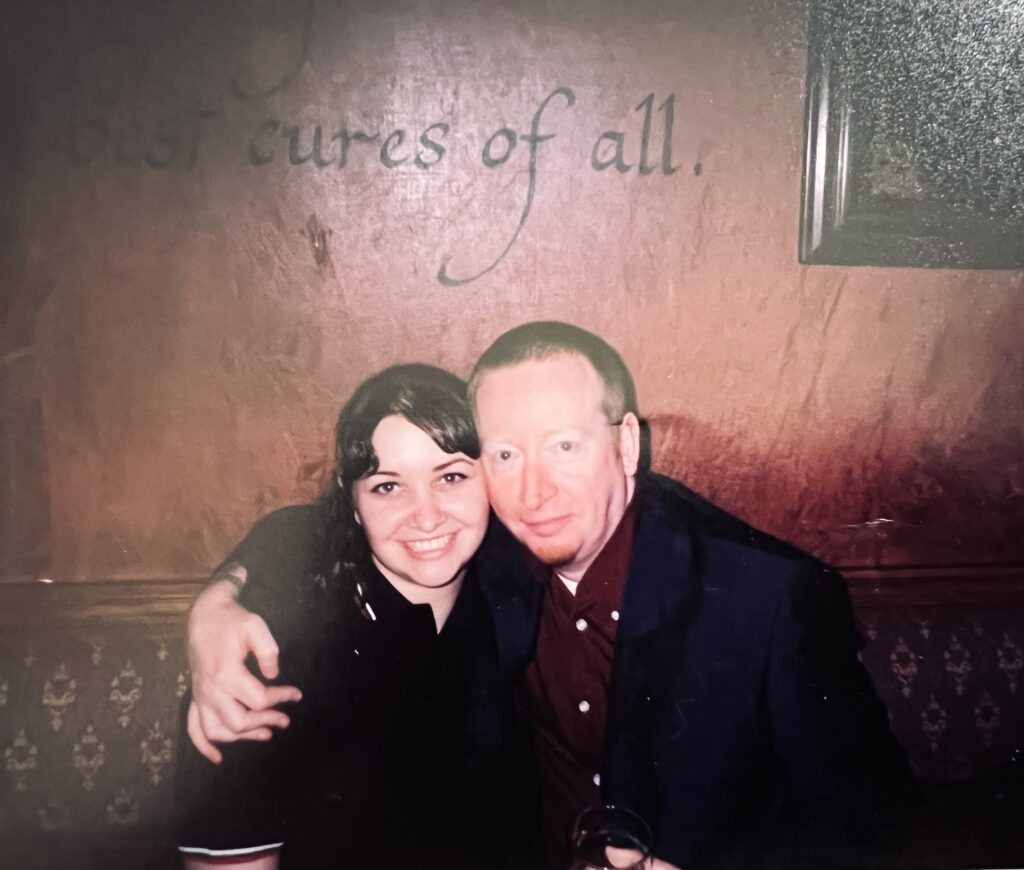
Margo and Dave King
